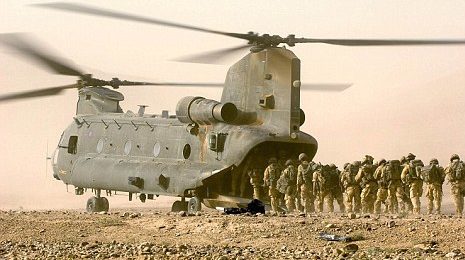War was declared from the unlikely venue of the Labour Party conference, held that year in Brighton. The mood in the hall was sombre, and the delegates were silent. In a fifty minute speech, Prime Minister Tony Blair gave what the papers called a “chilling warning” to the Taliban.
“There is no diplomacy with Bin Laden or the Taliban regime… We stated the ultimatum; they haven’t responded.”
Blair made another guarantee, to the “Afghan people”. “We will not walk away, as the outside world has done so many times before.” The Prime Minister received a standing ovation, left the conference hall, and returned to London. It was Tuesday October 2nd 2001.
Today a different Prime Minister announced the end of Britain’s involvement with NATO operations in Afghanistan. Flag-lowering ceremonies took place secretly last month. British troops were now “returning home”, said Boris Johnson.
‘All British troops assigned to NATO’s mission in Afghanistan are now returning home’
Boris Johnson announces the end of the UK’s force contribution to NATO operations in Afghanistan. pic.twitter.com/R4KgWCmF3V
— GB News (@GBNEWS) July 8, 2021
In a separate statement, the head of the armed forces, Sir Nick Carter, paid tribute to the servicemen who’d lost their lives in the conflict. The current situation in Afghanistan, with the Taliban effectively taking control of the countryside, and the educated middle-classes of the country desperately attempting to leave it, was “pretty grim”, he admitted. But there was a silver lining. The British army, according to Carter, “were never defeated on the battlefield.”
In the twenty years since Blair declared war on the Taliban, their fighters have seen off, or eluded, five British Prime Ministers, four American Presidents, NATO’s armies, and trillions of dollars of taxpayers money from Western nations. (Wars in Iraq and Afghanistan were estimated to have cost the Britain over £40 billion by 2013 — several thousand pounds per family.)
An irresistible illusion carried Blair into the war. “Post-9/11”, he said, “you no longer wait for the thing to happen. You go out actively and try to stop it.” We would fight in the terrorist’s backyard, not our own. We would strengthen the special relationship. We would make our country less vulnerable to attack. We would mould a stable liberal democracy into being in Afghanistan. On every count Blair, and Britain, lost.
Whatever Carter might think, the war in Afghanistan, along with the parallel conflict British forces fought in Iraq, will likely be judged as two bitter, unnecessary defeats. Many British casualties occurred because of under-resourced equipment. Men died due to a lack of armoured vehicles and helicopters — a fact that will probably be remembered only by historians.
The spontaneous public ritual that developed in the small town of Wootton Bassett, where people silently lined the roads as coffins flown back from Afghanistan were driven away from nearby RAF Lyneham, will likely linger longer in the public’s memory. The sentiment, while beautiful, and necessary, will obscure the fundamental lesson of the war — Britain lacked the power and capacity to fight it.
10,000 British troops were at one time deployed in Helmand province. This was much more British strength than was deployed in previous, mostly forgotten wars fought there in its 19th century imperial heyday. Yet they barely held their own against an enemy that was both omnipresent and imperceptible.
Far more than any prime minister’s words, the symbol of the British struggle in Afghanistan is the enormous hydro-electric turbine convoyed through enemy territory to Helmand’s Kajaki dam in 2008. It could not be installed because of continued enemy harassment.
Today the dam is operational and distributes power to more than 3 million people. Nominally run by the Afghan government, those who use the dam’s electricity pay for it in taxes — collected by the Taliban.










Join the discussion
Join like minded readers that support our journalism by becoming a paid subscriber
To join the discussion in the comments, become a paid subscriber.
Join like minded readers that support our journalism, read unlimited articles and enjoy other subscriber-only benefits.
Subscribe